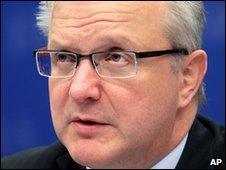EU finance ministers support tougher scrutiny rules
- Published

Mr Rehn said the EU had proven its determination to act
EU finance ministers have moved closer to agreeing to allow other governments to study their annual budgets before they are seen by national parliaments.
The UK government said it would reject this plan, but EU officials said a compromise had been worked out.
It comes as the finance ministers are meeting to establish further ways to tackle excessive government debt.
A rescue scheme for debt-ridden eurozone states has also been agreed and will begin by the end of June.
'Parliament first'
Plans to allow greater scrutiny of national budgets across the EU are being discussed by finance ministers at a two-day meeting in Luxembourg.
However the move is strongly opposed by the UK.
Financial Secretary to the Treasury Mark Hoban, who is attending in place of Chancellor George Osborne, said British budgets would continue to be first presented to UK MPs.
"The budget will be presented to Parliament first," he said.
"There is no question of anyone other than MPs seeing it first.
"Once the Chancellor has presented it to Parliament, it is of course publicly available."
A Treasury spokeswoman added that under the European Communities Act of 1972, the British budget had to be first presented to the UK Parliament.
French Finance Minister Christine Lagarde said later that the idea was not for the actual budget details to be seen by other governments, rather the broader economic targets.
Cheap loans
This 440bn-euro ($536bn; £363bn) fund - officially called the Special Purpose Vehicle (SPV) - will enable the 16 nations that use the single currency to access cheap emergency loans and loan guarantees, should they find themselves unable to raise money on the open market to pay their debts.
Member states hope it will never be needed, but that its existence will convince markets that default fears are unfounded.
It has been set up in response to the financial crisis in Greece, after fears that the Greek government would default on its loan payments and that the debt crisis could spread to other countries such as Spain, Portugal, and the Republic of Ireland.
'Removing uncertainty'
Co-announcing the financial aid package in Luxembourg on Monday, European Economic and Monetary Affairs Commissioner Olli Rehn said it meant that there was now "no uncertainty left about the eurozone's capacity to provide conditional aid to countries in fiscal trouble".
Luxembourg's Prime Minister Jean-Claude Juncker said the SPV would be fully operational within a month.
In addition to the SPV, the European Commission is making 60bn euros available "to cover urgent financial needs, were it to arise", while the International Monetary Fund will provide another 250bn euros.
The two-day meeting of EU finance ministers also approved Estonia's adoption of the euro from January of next year.
This will make Estonia the 17th country to use the single currency.
The meeting is also expected to agree to support sanctions for countries whose debt levels and budget deficits are growing too quickly.
Mr Rehn said he expected finance ministers to move "fast forward on reinforcing economic governance".
However, any decisions made by the finance ministers will still need to be finally agreed at a meeting of EU leaders in Brussels on 17 June.